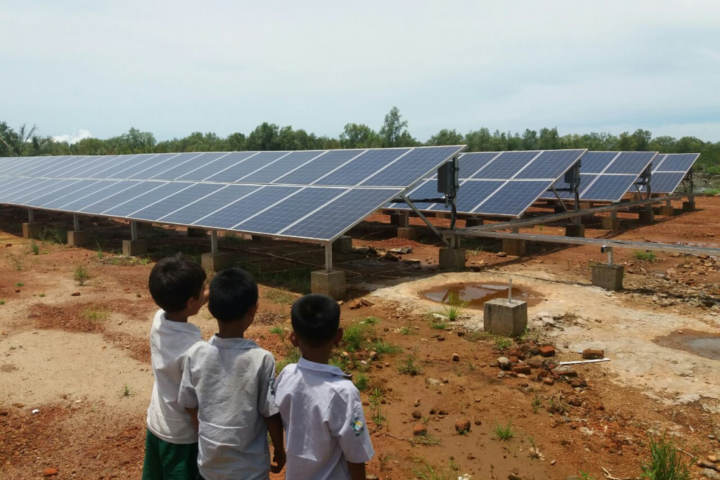Myanmar
Country
Finance mobilised (USD)
400000
Rural electrification and energy access, Solar
Technology
Brownfield
Business Type
Project IRR (%)
22
GHG mitigation impact (tonnes of CO2e/year)
82
Installed capacity (MW)
.21

Back when Techno–Hill Engineering, Ltd. was founded in 2016, the power needs of some 70% of Myanmar’s rural areas were still not being covered reliably by the country’s national grid. Such massive blind spots leave hundreds of villages on islands and remote areas, not to mention thousands upon thousands of Myanma with intermittent and overpriced power – or even no power at all. Perhaps nobody is more affected by these rural energy deficits than Myanmar’s female population.
When we look at the village women, their daily lives are quite hard. They have to wake up early, they have to use firewood to cook, and they have to do all the house chores.
Today, however, Techno-Hill’s mini-grids are providing power to over 4,450 such households, all previously out of reach from the national grid in Myanmar. For many of these women, it’s life-changing. Electricity not only provides women with an easier means of cooking and washing, but also creates opportunities for home industries and rural productive use enterprises, which in turn creates employment opportunities for women. With sufficient lighting at night, it creates a safer environment for movement and studying opportunities.
”Now that we provide 24-hour electricity, they can use electric cookers… they can save their time! Some households use a washing machine now, or an iron’’, says Aung. The mini-grids also have trickle down effects through contributing to the productive use of energy by their customers. ”One lady even started a bakery at her house,’’ says Aung. ‘’Some women [have] opened up shops now.”
With guidance from PFAN, Techno-Hill has been able to leverage what were initially unforeseen benefits and attracted support from a variety of sources. In addition to connecting previously off-grid sites, Techno-Hill is making greener energy more affordable and reliable for thousands of homes and SMEs. Their centralised and hybrid mini-grid systems sell more reliable power for less than previously paid for utterly unreliable and more carbon-costly services.
With a growth model built upon first targeting the villages with the highest potential revenue, Techno-Hill is shooting for the moon and is aiming to provide electricity to 50,000 households by 2025.
The project goes far beyond growing a customer base though. Well aware of the benefits her company’s mini-grids provide to Myanma women, Aung sets aside several kilowatt hours of energy free for public services, providing light to thousands in the form of street lamps, or free lighting for schools and hospitals. These developments benefit the region’s women in particular, improving access to health and education, providing the opportunity to walk home safely at night on lit streets and literally providing power to fuel those enterprising new ideas. Aung also works to share her learnings and insights with others, for example, her participation on the PFAN panel at the Asia Clean Energy Forum 2022.


Nexus for Development, a non-profit which provides access to finance for clean energy in Asia, has been working with Techno Hill since 2019 and saw the potential for expansion. They manage the Pioneer Facility fund which provides scale-up capital to enterprises that offer sustainable energy and clean water solutions to underserved populations in Southeast Asia. The fund’s USD 400,000 loan is the first international investment into the company, which will finance the CAPEX for a new 209 kW solar mini-grid project at Thae Chaung village in Southern Myanmar. It will provide reliable 24-hour electricity supply for 500 households or 2100 people, 90 streetlights, 5 public facilities and 23 productive use of energy (PUE) businesses.
“We are pleased to support the continued growth of Techno-Hill with a Pioneer Facility loan. Mrs. Barani’s dedication to providing affordable energy to remote communities of Myanmar is truly inspiring and we are proud to financially support her in driving towards this goal,” says Laura Alsenas, Executive Director, Nexus for Development.
This investment is a huge boon for Aung, and she’s ready for the next step. She plans to continue to scale up and is seeking further equity or debt financing for Techno-Hill.
”The coaching gave her a better sense of the overall value proposition and an enhanced perspective on the critical work she does for vulnerable rural women and communities,’’ says Min Chan Win, Techno-Hill’s PFAN Advisor. ‘’Based on this, she’s working towards sharpening her investment pitch, so that the newly attracted capital could not only benefit Techno-Hill, but also be meaningful for the rural beneficiaries across the country.’’
